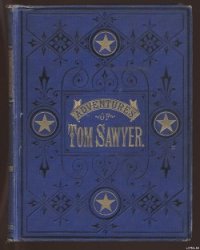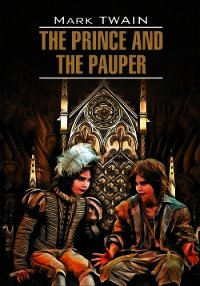Английский язык с Марком Твеном. Принц и нищий (Mark Twain. The Prince and the Pauper) - Twain Mark (читать хорошую книгу полностью .txt) 📗
grisly [`gr?zl?], grotesque [grqu`tesk], gaud [gO:d]
Hendon was touched. The water welled to his eyes, yet at the same time the grisly humor of the situation and circumstances so undermined his gravity that it was all he could do to keep some sign of his inward mirth from showing outside. To be suddenly hoisted, naked and gory, from the common stocks to the Alpine altitude and splendor of an earldom, seemed to him the last possibility in the line of the grotesque. He said to himself, 'Now am I finely tinseled, indeed! The specter-knight of the Kingdom of Dreams and Shadows is become a specter-earl! — a dizzy flight for a callow wing! An this go on, I shall presently be hung like a very May-pole with fantastic gauds and make-believe honors. But I shall value them, all valueless as they are, for the love that doth bestow them. Better these poor mock dignities of mine, that come unasked from a clean hand and a right spirit, than real ones bought by servility from grudging and interested power.'
The dreaded Sir Hugh wheeled his horse about, and, as he spurred away, the living wall divided silently to let him pass, and as silently closed together again. And so remained; nobody went so far as to venture a remark in favor of the prisoner, or in compliment to him; but no matter, the absence of abuse was a sufficient homage in itself. A late comer who was not posted as to the present circumstances, and who delivered a sneer at the 'impostor' and was in the act of following it with a dead cat, was promptly knocked down and kicked out, without any words, and then the deep quiet resumed sway once more.
CHAPTER XXIX (Глава двадцать девятая)
WHEN Hendon's term of service (когда срок отбывания наказания Хендона; term — срок) in the stocks (в колодках) was finished (был окончен), he was released (он был отпущен) and ordered (и получил приказ; to order — приказывать) to quit the region (покинуть эту местность) and come back no more (и не возвращаться больше: «приходить назад не больше»). His sword was restored to him (его меч был возвращен ему), and also his mule and his donkey (а также его мул и его осел). He mounted and rode off (он взобрался и уехал прочь; to ride — ездить верхом), followed by the king (сопровождаемый королем), the crowd opening (толпа раскрывшаяся = причем толпа расступилась) with quiet respectfulness (с молчаливым уважением) to let them pass (чтобы дать им пройти), and then dispersing (и затем разошлась) when they were gone (когда они ушли).
Hendon was soon absorbed (Хендон был скоро поглощен = погрузился) in thought (в мысли). There were questions of high import (были вопросы высокой важности) to be answered (чтобы быть отвеченными = на которые надо было ответить). What should he do (что должен он делать)? Whither should he go (куда должен он пойти)? Powerful help must be found somewhere (сильная помощь должна быть найдена где-нибудь; to find — найти), or he must relinquish his inheritance (или он должен отказаться от своего наследства) and remain under the imputation (и остаться под пятном = с плохой репутацией) of being an impostor (того, чтобы быть самозванцем) besides (кроме того). Where could he hope to find this powerful help (где мог он надеяться найти эту сильную поддержку)? Where, indeed (где, действительно)! It was a knotty question (это был запутанный вопрос; knot — узел). By and by (постепенно: «мимо и мимо») a thought occurred to him (мысль случилась = пришла к нему) which pointed to a possibility (которая указала на некоторую возможность) — the slenderest of slender possibilities (на слабейшую из слабых возможностей), certainly (конечно), but still worth considering (но все же стоящую рассмотрения), for lack of any other (за отсутствием какой-либо другой) that promised anything at all (которая обещала бы что бы то ни было вообще). He remembered (он вспомнил) what old Andrews had said about the young king's goodness (что старый Эндрюс сказал о доброте молодого короля) and his generous championship (и его великодушном заступничестве) of the wronged and unfortunate (за обиженных и несчастных). Why not go and try (почему бы не пойти и не попытаться) to get speech of him (получить речь от него = поговорить с ним) and beg for justice (и молить о справедливости)? Ah, yes (ах да), but could so fantastic a pauper (но мог ли такой странный нищий бедняк) get admission (получить допуск) to the august presence of a monarch (к августейшей персоне монарха)? Never mind (неважно: «никогда не беспокойся») — let that matter take care of itself (пусть этот вопрос позаботится о себе сам = разрешится сам); it was a bridge (это был мост) that would not need to be crossed (который не нужно было переходить) till he should come to it (прежде чем он пришел бы к нему = нужно было потерпеть). He was an old campaigner (он был старый воин), and used to inventing shifts and expedients (и привычный к изобретению уловок и приемов); no doubt (несомненно: «никакое сомнение») he would be able to find a way (он будет способен найти путь = способ). Yes, he would strike for the capital (да, он направится к столице). Maybe his father's old friend (может быть, давний друг его отца), Sir Humphrey Marlow (сэр Хамфри Марло), would help him (поможет ему) — 'good old Sir Humphrey (добрый старый сэр Хамфри), Head Lieutenant of the late king's kitchen (главный лейтенант кухни покойного короля), or stables (или конюшен), or something (или чего-то = в этом роде)' — Miles could not remember (Майлс не мог вспомнить) just what or which (чего именно; what — что; which — который). Now that he had something (теперь, когда у него было что-то) to turn his energies to (на что направить свою энергию: «повернуть свою энергию к»), a distinctly defined object to accomplish (ясно определенный объект, чтобы /его/ достичь), the fog of humiliation and depression (туман унижения и уныния) that had settled down upon his spirits (который опустился на его дух) lifted and blew away (поднялся и рассеялся; to blow away — быть сдуваемым ветром: «дуть прочь»), and he raised his head (и он поднял свою голову) and looked about him (и огляделся вокруг: «посмотрел вокруг себя»). He was surprised to see (он был удивлен увидеть) how far he had come (как далеко он зашел; to come — прийти); the village was away behind him (деревня осталась далеко позади него). The king was jogging along in his wake (король медленно ехал вслед за ним), with his head bowed (со своей головой склоненной); for he, too (ибо он также), was deep in plans and thinkings (был = погрузился глубоко в планы и раздумья). A sorrowful misgiving (грустное опасение; sorrow — горе, печаль, скорбь; misgiving — опасение, предчувствие дурного) clouded Hendon's newborn cheerfulness (омрачило новорожденную жизнерадостность Хендона); would the boy be willing (захочет ли мальчик: «был ли бы мальчик желающим») to go again to a city (пойти снова в город) where, during all his brief life (где, в течение всей его короткой жизни), he had never known anything (он никогда не знал чего-либо = ничего; to know — знать) but ill usage and pinching want (кроме плохого обращения и мучительной нужды; to pinch — щипать; сдавливать)? But the question must be asked (но вопрос должен быть задан); it could not be avoided (он не мог быть избегнут); so Hendon reined up (так что Хендон остановил коня; to rein up — остановить коня: «натянуть поводья вверх»), and called out (и крикнул):
'I had forgotten to inquire (я забыл спросить) whither we are bound (куда мы направляемся; bound — направляющийся). Thy commands, my liege (твои приказания, мой повелитель)?'
'To London (в Лондон)!'
Hendon moved on again (Хендон двинулся дальше снова), mightily contented with the answer (весьма удовлетворенный ответом) — but astonished at it, too (но пораженный им тоже).




